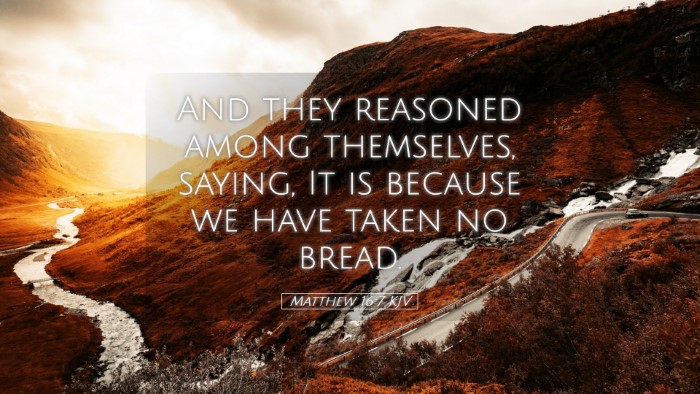Bible Commentary on Matthew 16:7
Verse: "And they reasoned among themselves, saying, It is because we have taken no bread."
Introduction
This verse is part of a larger narrative in the Gospel of Matthew, where Jesus is teaching His disciples about the dangers of the Pharisees' and Sadducees' doctrines. In this commentary, insights from various public domain sources are combined to provide a richer understanding of the text.
Contextual Analysis
The prior passages in Matthew 16 set the stage for this moment. The disciples have just witnessed the miraculous feeding of the multitudes. However, amidst this supernatural provision, they are caught up in practical concerns about material food.
Disciples’ Concerns
According to Matthew Henry, the disciples’ concern over bread represents a broader spiritual misunderstanding. They miss the significance of Jesus' teachings by focusing only on their immediate physical needs. This reflects a common human tendency to operate within the limits of the natural rather than grasp the spiritual truths being revealed.
Spiritually Blinded
Albert Barnes highlights the idea that the disciples are spiritually blinded to the metaphoric teachings of Jesus regarding leaven. Their reasoning indicates a lack of faith and understanding about who Jesus is; He is not just a miracle worker, but the source of all sustenance. The disciples' worry is tinged with misconception about His capabilities, as evidenced by their remark on having 'no bread.'
Theological Implications
This verse serves as a reflective moment on faith and understanding of God’s provisions. Adam Clarke notes that this incident demonstrates humanity's propensity to forget past miracles when faced with present difficulties. It showcases a lack of faith in the face of Jesus' teachings and miracles.
Leaven as a Symbol
The “leaven” mentioned by Jesus earlier (not found in this verse but critical to the context) symbolizes corruption and false teaching. Matthew Henry explains that Christ’s warning about the leaven of the Pharisees and Sadducees goes unheeded by the disciples, who are lost in their temporal concerns.
Self-Reflection in Ministry
For pastors and theologians, this passage invites self-examination about their reliance on God amidst congregational demands and worldly distractions. Are they more concerned with material provisions rather than spiritual growth? Albert Barnes emphasizes that leaders must continually point their congregations back to the sufficiency of Christ.
Practical Applications
- Trust in God: This passage reminds believers to trust in God’s provision, even when faced with scarcity.
- Focus on Spiritual Leadership: Leaders must maintain a vision that transcends immediate needs, directing focus toward spiritual nourishment.
- Awareness of Doctrine: Christians must be aware of the influence of false teachings—symbolized by leaven—and guard their hearts against such corruption.
Conclusion
In summary, Matthew 16:7 serves as a cautionary tale against practical reasoning devoid of faith. Engaging with the insights provided by Matthew Henry, Albert Barnes, and Adam Clarke, allows us to grasp the depth of Jesus' teachings and the disciples' misunderstanding. As followers of Christ engage with this text, they are called to reflect on their own responses to the divine and to hold fast to faith amid life's uncertainties.


